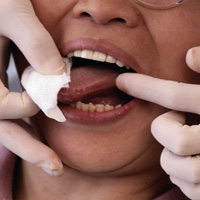 Chinese herbs can play a role in oral cancer inhibition according to a study recently published in the Journal of Biological Chemistry, Febuary 2010. Surgery, radiation and chemotherapy have been the tri-fecta standard of care for oral squamos cell carcinoma (OSCC) yet the past 20 years survival rates have not improved.
Chinese herbs can play a role in oral cancer inhibition according to a study recently published in the Journal of Biological Chemistry, Febuary 2010. Surgery, radiation and chemotherapy have been the tri-fecta standard of care for oral squamos cell carcinoma (OSCC) yet the past 20 years survival rates have not improved. Celastrol is a chemical found in the Chinese herb called Thunder God Vine (Tripterygii Wilfordi Radix Folium). Various preparations of Thunder God Vine have been used in Asia over the last 50 years in the treatment of a number of autoimmune and inflammatory diseases.5
1 Department of Medicinal Chemistry, Shanghai Institute of Materia Medica, Chinese Academy of Sciences, Shanghai 201203, PR China &
2 Department of Oral and Maxillofacial Surgery, Second Affiliated Hospital, Zhejiang University School of Medicine, Hangzhou 310009, PR China
4Department of Medicinal Chemistry, Shanghai Institute of Materia Medica, Chinese Academy of Sciences, Shanghai 201203, PR China
& Department of Oral and Maxillofacial Surgery, Second Affiliated Hospital, Zhejiang University School of Medicine, Hangzhou 310009, PR China
5. The Chinese anti-inflammatory and immune suppressive herbal remedy Tripterygium wilfordii
http://www.ncbi.nlm.nih.gov/pubmed/10680192
6 Celastrol in prostate cancer therapies. http://www.ncbi.nlm.nih.gov/pubmed/19545787

